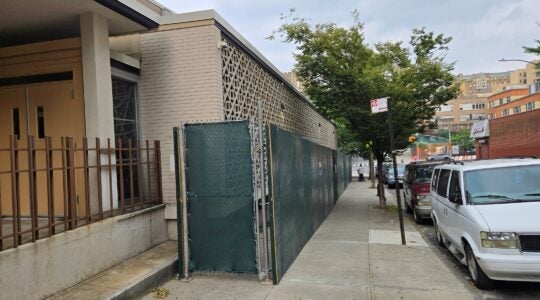With the curtain about to rise on the world’s most famous Passion Play, a team of Christian and Jewish scholars is giving it a thumbs down. It’s not the acting or pacing the reviewers are concerned about. Rather it’s the script for the latest production of the 366-year-old Oberammergau Passion Play, produced and performed by residents of the little Bavarian town.
More specifically the reviewers, brought together by the American Jewish Committee’s Department of Interreligious Affairs, panned the English translation of the German text because of its anti-Jewish content.
The play, detailing the trial and death of Jesus based on the New Testament, is performed about every decade and has historically contained many anti-Jewish elements, despite occasional revisions. The 1934 script putting Jews in black costumes with horn-like headgear was praised by Hitler as a "precious gift" in the fight against Jews. For the 2000 production, director Otto Huber worked with Jewish groups in an attempt to eliminate virulent anti-Judaism from the production and script. But these efforts did not assuage the reviewers, who in a report released last week concluded that producers did not go far enough to eliminate the nearly 2,000-year-old Church teaching that Jews as a collective people killed Jesus: a concept rejected by the Vatican in 1965.
And that’s a major concern for AJCommittee interreligious director Rabbi A. James Rudin, who assembled the team of scholars.
"Text is what drives the production," said Rabbi Rudin, who acknowledged he has not seen the new version of the play, which opens May 21. "The eight scholars, including five Christians, and myself were uniformly critical of the text."
Rabbi Rudin notes the six-hour play attracts tourists from around the world, mostly Americans, who pump millions into the village.
"For many of the 500,000 who will come to Oberammergau, the Passion Play will be perceived as a deeply moving religious experience and not simply a theatrical presentation," the rabbi said. "I had hoped that the script of the 2000 year production … would at last be purged of all anti-Jewish elements, but a study of an English translation of the German language text reveals this will not happen and I am profoundly disappointed."
Rabbi Leon Klenicki, director of interfaith affairs for the Anti-Defamation League, also noted "serious problems" with the latest script while acknowledging many changes in staging and dialogue to "avoid anti-Judaism."
In a new ADL report, Rabbi Klenicki wrote of the concern over the "very negative presentation of Jewish leadership in the complex society of the first century."
"It implies a sense of community guilt for Jesus’ death, minimizing Pilate’s and Roman responsibility for the death of Jesus.
"Both rabbis have been working with Oberammergau officials for three decades to effect changes, but Rabbi Rudin’s review team adds a new dimension to the debate, particularly the comments by Christian scholars.
They come in the glow of Pope John Paul II’s historic apology and actions in Israel, especially his request for God’s forgiveness at the Western Wall for the persecution of Jews: the same area where Jesus was tried and crucified.
One of the AJCommittee reviewers, Sister Mary C. Boys, a theology professor at Union Theological Seminary in Manhattan, said that Oberammergau "continues to teach anti-Judaism."
She was troubled by the text’s "extraordinary emphasis on the people’s (read Jews) resolve that Jesus be put to death," taken from the Gospels.
Rev. John T. Palikowski of the Catholic Theological Union in Chicago called the script "significantly flawed" and expressed "deep disappointment."
The liberal Catholic called it a "fictionalized account … that fails to take into account what biblical scholars are saying today." He noted that the Jewish priests are portrayed as totally wicked.
"All in all," he said, "I do not feel the 2000 version of the play should be supported."
Dr. Eugene Fisher, associate director for ecumenical affairs for the National Conference of Catholic Bishops, agreed there were "serious problems remaining that have to do with the way the play is structured, and not simply a phrase here or there that can be fixed in time for 2000."
And Lutheran scholar Dr. Norman Beck at Texas Lutheran University contended that the new script is actually more problematic than earlier versions despite excising the infamous "blood curse" against Jews found in Matthew 27:25.
However, Dr. Franklin Sherman, an interfaith relations expert at the Evangelical Lutheran Church, was more positive, saying that "on the whole the improvements to the traditional text are impressive, and go a long ways toward eliminating the elements of the teaching of contempt that marred previous versions."
On the Jewish side, Dr. Michael Cook of Hebrew Union College lamented that any subtle changes this year are likely to be lost on the audience.
But Muhlenberg College Religion Professor Alan Mittleman said the new text "demonstrates good will and shows the spirit of dialogue."
So what to do in the future? Should Jewish scholars continue to be theater critics of the German play, whose script must ultimately be approved not only by the director but, oddly enough, voted on by Oberammergau’s mayor and council?
Rabbi Klenicki admits that Passion Plays generally are sources of theological anti-Judaism. And Rabbi Rudin says ultimately a whole new script is necessary, one that will be true to the story yet not demonize Jews as a people.
"You cannot change the New Testament," he said, referring to anti-Jewish rhetoric contained there written by first century Christians, formerly Jews, arguing with Jewish leaders over Jesus.
But, Rabbi Rudin adds, "It’s what you do with the material. You can come up with a play that is spiritually satisfying but doesn’t make the Jewish people the villains of the piece."
The New York Jewish Week brings you the stories behind the headlines, keeping you connected to Jewish life in New York. Help sustain the reporting you trust by donating today.




